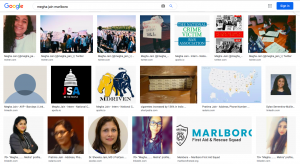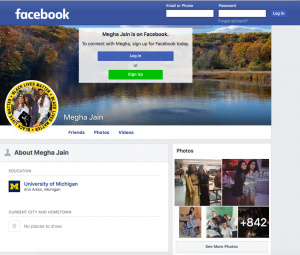Megha Jain
Joining Facebook at the age of 12 seemed like a life milestone at the time. I felt like I was entering a new world where I could stay connected with friends while spending my summers in India, and find and communicate with long distance family members while living in the U.S. Social media was something that was integral to my family because of how far we were from close relatives. After they immigrated, my parents utilized it to update their parents and siblings on their lives when phone calls were extremely expensive. As I have gotten older, social media has become integral to my life for the same reasons and more. With the time difference, my online presence is my way of sharing my experiences with my family abroad, without having to navigate time zones to talk to them. It is also a way to share my life with friends from home while at school and with friends at school while at home. In the midst of a pandemic, this is an especially important outlet that has grown tremendously. My online identity also serves a professional purpose, as I create an image of myself to connect with employers and others interested in similar industries.
My online identity culminates through a variety of sources in unique ways. I explore the differences between my public and private identity, discuss the control we have online, and draw conclusions about what this all says about me, as an individual, and society, as a whole.
Contents
My Online Identity
I was curious to explore who I am in the online world and if that identity resonated with me. I know that I have control over what I choose to share through my social media accounts, but how much control do I have over what search engines like "Google" and data broker websites like "Instant Checkmate" are programmed to associate with my name?
When searching my name on Google, I expected to find at least a couple results that directly pertained to me, considering that I am averagely active on social media and that I have an uncommon name. However, just searching "Megha Jain" produced no pictures, websites or accounts that represented my personal data - in fact, I looked through the first ten pages of Google results and found no trace of myself. When I tried searches adding my hometown as well as "umich" after my name, I was able to find more results that represented what I believed to be my online identity. Adding my hometown produced my LinkedIn and Facebook accounts, work experiences like my recent internship and my hometown First Aid Squad, and images of me leading a protest in high school. Adding "umich" finally produced an identity that feels close to my 20-year old self. Although the second result belongs to a university Professor who shares a similar name (whose emails I receive quite frequently due to our similar uniqnames), the top results include my LinkedIn profile, an article on my run for CSG, organizations that I am a part of, and my major.
And if I pieced these together and ran a couple more searches with other identifiers like a job, "Ann Arbor", or an organization that I am a part of, I would probably produce an identity that resembled my own offline. However, Google, by itself, failed to do that.
Instant Checkmate
When accessing data broker website "Instant Checkmate" , the amount of information it promised to provide me coupled with the fact that I had to pay to access the data report they produced made me nervous as to how much information they would be able to find out about me. Was my personal information including my phone number, location, assets, work experience, licenses really so easily accessible? As the website continued to "extensively search their public records", I thought about my multiple social media accounts and how much information I put out into the online world without realizing. I was pleasantly surprised when Instant Checkmate could pull almost no information about me. Although they had found my date of birth, my star sign, my address, and my facebook account, their records had given me a middle initial even though I have no middle name. This left the rest of their data empty as they were searching for someone- associated with their initial information- that does not exist.
Social Media
Our social media presence is an interesting facet of our online identity because we have a lot of control over what we choose to present. Although we cannot control how others will interpret us based on our content, that does not quite stray from real life- we have control over our actions and choices, but we cannot control what others think of us. While I am relatively active on my Instagram and Facebook accounts, based on the result from Google and Instant Checkmate, the information I provide there does not seem to have a huge impact on my public online presence. My private one, however, allows me to share my life with friends and family and, therefore, includes more details like recent pictures, interests, organizations that I'm involved in, fundraisers that I am passionate about, and other daily updates that reflect the progression of my life.
I know that these different identities do not fully represent who I am as a person- but is that because of algorithmic inaccuracy or because of human control?
Control Online
At times, it feels like we have very little control in life, this pandemic being the penultimate example. The obsession with social media today seems to revolve around society's ability to have a sense of control in our fast paced world that was not possible before. Based on my multiple online identities demonstrated above, there is an interesting distinguishment to be made between our private and public online identities. We control what we choose to show to our family and friends along with others in our network. It could be argued that we therefore also control what of ourselves we choose to show to the rest of the world. It is up to us as individuals if choose to wield this control by using social media or avoiding it.
When Beauty is Not in the Eye of the Beholder
Social media is a utopian concept in some senses, and gives us the ability to show the world how we want them to see us. Oftentimes, including in my case, our public identity is designed to be viewed by those that we do not also know in real life and has more professional qualities. Perhaps this is because there is less of a risk of being "unacceptable" or "inappropriate" if we have a version of our identity that conforms to unspoken guidelines, such as no images with alcohol and no captions with profanity. Not showing aspects that might give an idea of who we are as a person (as we might do on our private accounts) also allows us to prevent others outside our network from being able to make deeper assumptions while still being able to interact with us in the online world. This reduces an anxiety that many experience in person- what kind of first impressions do we make? Through the online world, we can choose how much we show of ourselves initially.
In terms of our private accounts, we are able to share anything we choose, whether that include photos from our daily lives, artwork, music, opinions, and so much more. The difference between our online interactions and our in person interactions with this group is that in real life we have little control over how others perceive us. It can be argued that an online presence allows us to take back some of that control and push others to see us how we see ourselves or how we hope to be perceived.
Hey Siri, Are You Listening?
Interestingly enough, the same idea that draws some people to social media is the same idea that pushes some away- the potential for a lack of control. If the google searches or data broker website had led me to find out that much of the information I thought to be private was public to the whole world, my sense of somewhat false security would be shattered. Nowadays, there is a fear over what data different platforms, companies, and even our own phones are collecting about us. How are they getting it, and what are they using it for? When we use our voice controls on our iPhone, Apple is collecting the sound of our voice and what we say. When we search for something on Google, the engine is adjusting its information about our interests and priorities. When we shop online, the websites follow us to our Facebook and Instagram feeds, badgering us with ads. And when we have conversations, where we think the only people that can hear us are humans in the room, our devices are listening and capturing our conversations. The scariest part for many is that it often happens without our knowledge, and even if we see some of the ways the data is being used, we do not know what else is being done with it. The same tool we once used to take control is now being used to take control of us.
But although I am aware of these faults of social media and the online world, my exploration of my data identity through multiple sources has yet to show me that anything is out of my control- so I think I will let digital Megha exist for a little longer. The question is, do I really have a choice?


